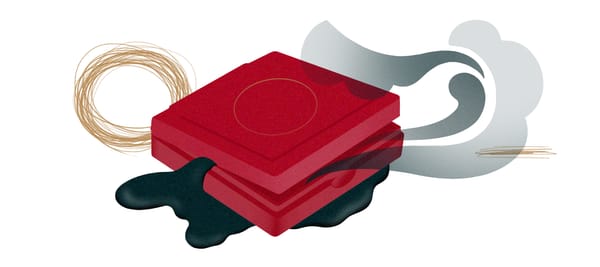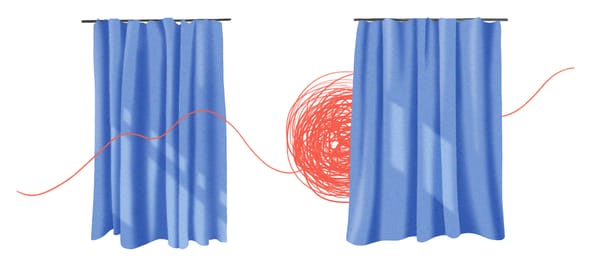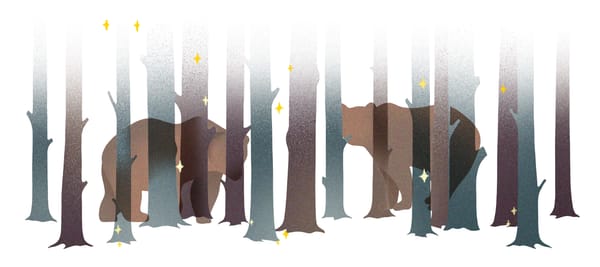by Rebecca McClanahan | Undeliverable holiday wishes.

Even now, two months dead, you get more mail than I do. Last week, a Christmas card from an old Marine buddy who hasn’t heard from you in a while, and could you stop by the next time you drive through Kentucky? Barack and Michelle send their holiday greetings. No autographed photo from them this year, but I’ve saved the one you displayed above your desk. The Disabled American Veterans thank you for your donation, and the bald children of St. Jude’s, and all the boys of Boys Town. Planned Parenthood hasn’t written in a while, but on behalf of all the women whose lives your gifts supported, I would like to thank you.
Yesterday five cards came for Mother, laced with sympathy for her loss, this first Christmas without you. “Why are they so sad?” she asked. “Who did we lose?”
I thought of how you would have answered and steeled myself to announce the truth. Then something caught her attention—a sparrow at the feeder—and her mind flitted out the window. I wanted to fly out with it, to anywhere but here. That long year you were in Japan—“flying a mission” was Mother’s answer when we asked—she gathered our messages into one large envelope, care of the United States Marine Corps. Rick’s and Claudia’s were just crayoned pictures, and Jenny’s and Tom’s were in cursive, which I had not yet mastered. But I knew how to form capitals and lowercase, and how to fasten them to the solid and perforated lines. I knew how to find you on the globe the teacher kept on her desk. And by the end of second grade I’d learned to properly prepare an envelope, complete with return address, so that it didn’t end up in the Dead Letter Office, a place I imagined as a dark and shadowy basement, with spiders nesting on piles of envelopes. Hundreds, thousands of envelopes careless children had not addressed correctly.
The Dead Letter Office is no more, Dad. Its new name is the Mail Recovery Center, whose stated mission is to “unite undeliverable letters to sender and recipient.” But if undeliverable, how can they be united? Or, as Li-Young Lee’s poem asks, of the son and the newly dead father, “How . . . will each find each?” Those ten nights you lived your dying—“It’s hard work,” the nurse had warned me—I spoke poems to the air, hoping beyond hope that you could hear them. I wanted the blank room to fill with voices.
A few days ago, a letter came from Tom. Of all your children, he seems most wounded by your death: paralyzed is the word he reaches for as he writes. He’d had another bad night and was up late reading Dylan Thomas, the famous poem I once recited for you. I remember afterwards how you scratched your head and said, “Well, it’s a good poem but a bit repetitive. I got the point the first time,” meaning, of course, the refrain: “Do not go gentle into that good night.” When I explained the form—a villanelle, based on repetition—you had a good laugh. “Oh, so it was intentional,” you said, and laughed again, setting me free to laugh with you. In the letter Tom described his recurring dreams, how you’re always standing watch beside him. Then he asked, “Did our father go gentle? I wasn’t there. I need to know.” The strange thing is, I missed the question at first, I was so struck by the our. What a gift, I thought, to use the first-person plural, to include me in his grief: our father. It made me see how selfish I’ve been. “My father,” I always say, as if I am alone in this.
I wondered how to answer, how much Tom could bear. When I wrote back, I said that for days, yes, you did “rage against the dying of the light,” but finally, you let go, and that was the hardest part for me to watch. The letting go. The going gentle.
As for the bills, I’ve paid them swiftly, as you taught, and closed out the accounts in your name. Still, the mail keeps coming: banks, utility companies, physicians, the insurance adjusters who paid out your death. The hospital wants to know how you would rate your most recent experience. How would you rate it, Dad? I had expected it to be easier, but for days you would not let go, your eyes squinting against the ceiling light, your hands alive in the air as if in combat or supplication. I was with you up until the moment your “most recent experience” ceased and you entered whatever realm dead fathers enter. I kept thinking of the e. e. cummings poem about the “defunct” Buffalo Bill, the part where cummings asks Mister Death how he likes his “blue-eyed boy.” Thank you for closing your eyes so that I didn’t have to.
Mother repeated her question, “Who did we lose?”
I weighed my answer as if on a scale: your memory against her next peaceful moment. To be forgotten, I imagine, is unimaginable. Years ago, touring Warwick Castle, I saw the metal grille in the dungeon floor. “Oubliette,” the guide announced. “The word means forgotten. For prisoners the captors wished to forget.” When you were in Vietnam flying your last mission, I tried to write you a letter. It was 1965; I’d just turned fifteen. That’s turned, as in went bad, as in spoiled, like fruit, by some boy’s sweet handling. Turned as in rotated, as in turned my back on you. The letter was to be my declaration of independence, to set us both free. I never finished it.
How “will each find each?” By singing, Lee concludes: “You must sing to be found.” I’m still waiting for your voice. Until then, the stack of mail keeps growing. The Smithsonian misses you and wants you back. Time wishes to reinstate you. A new offer came from AAA, towing included, and a credit card promising 50,000 free air miles: “Imagine the places you could travel!” I’m sorry to borrow the words of others, but my own keep failing me. I’m still the second grader writing to her father. I remember the hard labor. How I placed my index finger after each period to space out my sentences. How the eraser tore the paper so that I had to start again, and again.
Rebecca McClanahan’s eleventh book, In the Key of New York City: A Memoir in Essays, was published in 2020. Her work has appeared in the Best American Essays and Best American Poetry series, and in anthologies published by Simon & Schuster, Beacon, Norton, and Bedford/St. Martin’s, among others. Recipient of two Pushcart Prizes, the Glasgow Prize for nonfiction, and the Wood Prize from Poetry magazine, McClanahan teaches in the MFA program of Queens University of Charlotte. More at rebeccamcclanahanwriter.com and on Facebook.
This essay first appeared at Kenyon Review Online (2017).
PS/ Our current submission call closes today.






